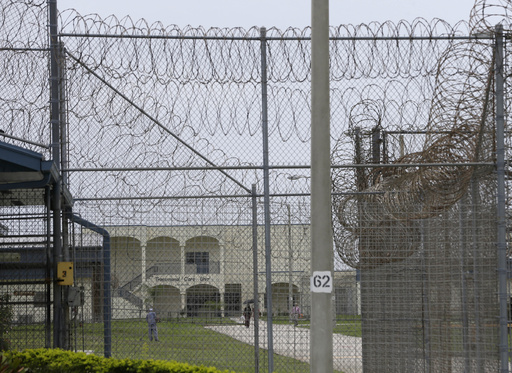
TALLAHASSEE, Fla. — Parts of South Florida experienced the hottest September in over a hundred years, prompting serious concerns about the conditions within the Dade Correctional Institution, situated approximately 45 miles southwest of Miami near the Florida Everglades. Dwayne Wilson, an inmate, recounted hearing his elderly cellmate, an 81-year-old man, struggle to breathe and urgently call for assistance. The man, who is identified as J.B. in a recent federal class action lawsuit, had been wheelchair-bound and had reportedly complained about severe chest pain and breathing difficulties while confined in an inadequately ventilated dormitory.
On September 24, early in the morning, the lawsuit details that J.B. was once again heard pleading for help. A fellow inmate wheeled him to the infirmary, but within 15 minutes, medical staff instructed that he return to his cell. Shortly thereafter, J.B. was discovered unresponsive, with a grim indication of his condition.
Legal representatives disclosed that on the day of J.B.’s demise, the exhaust fans in his dormitory were not operational, and the heat index soared to an alarming 104 degrees Fahrenheit (40 degrees Celsius). One inmate described the oppressive living conditions as akin to “being locked in a sardine can with no air to breathe.” Such extreme temperatures have proven detrimental, particularly for vulnerable populations like the elderly and disabled inmates.
The Florida Justice Institute, which filed the lawsuit this week, argues that persistent heat at the facility has been a contributing factor to four inmate deaths. It claims that prison officials have not taken appropriate steps to protect elderly and disabled inmates from heat-related risks. This legal action includes the Florida Department of Corrections, its secretary, and the warden of Dade Correctional Institution as defendants, contending that the prevailing conditions violate both the Eighth Amendment’s prohibition against cruel and unusual punishment and protections under the Americans with Disabilities Act and the Rehabilitation Act.
Andrew Udelsman, an attorney for the Florida Justice Institute, emphasized the necessity of this lawsuit, stating that the concerns raised by inmates and advocacy groups have seemingly been ignored. He argued that it appears a judicial intervention is needed for the prison system to address these paramount issues.
A representative for the Department of Corrections when approached for comment indicated that the department refrains from public statements on ongoing legal matters and claimed it had yet to be served with the lawsuit documents.
Extreme heat has emerged as the foremost cause of weather-related fatalities, as noted by the World Health Organization. Although dangerous heat has long been a concern, experts assert that climate change has intensified its impact regarding frequency, duration, and scale. An analysis of data from the Centers for Disease Control and Prevention indicated that the U.S. saw its highest recorded heat-related deaths in over 80 years last year.
Despite this alarming reality, most prisoners in Florida, especially during scorching weather, are confined to cells lacking air conditioning. This situation is particularly precarious for older inmates and those with pre-existing health conditions that heighten their susceptibility to heat-related ailments. A statement from Department of Corrections Secretary Ricky Dixon to state legislators highlighted that approximately 75% of the state’s prison housing units lack air conditioning. Prior legislative efforts to mandate air conditioning installations in state prisons failed to progress in the Republican-controlled legislature.
At a legislative hearing last October, Republican State Senator Jennifer Bradley pointed out the stifling conditions in non-air-conditioned facilities. She stressed the need for corrective measures to address the heat before the state finds itself embroiled in another lawsuit, which could prove costlier in the long run.
Florida is not singularly exposed to such legal challenges, as similar lawsuits have emerged from Texas, Louisiana, and New Mexico. A troubling case in Georgia from July involved a 27-year-old inmate reportedly succumbing after being left in an outdoor cell without water, shade, or ice for an extended period.
Udelsman expressed hope that the lawsuit in Florida could lead to courts establishing standardized safety protocols for inmates susceptible to hazardous heat exposure, particularly as climate change poses a growing threat to an already vulnerable prison demographic. He noted that courts increasingly recognize the unconstitutionality of such inhumane conditions and expressed optimism that this lawsuit could contribute to an ongoing movement toward reform.
